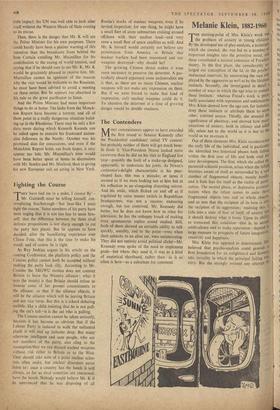Fighting the Course
'ITN HEY have tied me to a stake, I cannot fly'-- I Mr. Gaitskell must be telling himself, con- templating Scarborough—`but bear-like I must fight the course.' Some members of his party have been urging that it is not too late to untie him- self; that the difference between the three rival defence propositions is not sharp enough to cut the party into pieces. But he appears to have decided, after the humiliating experience over Clause Four, that this is the time to make his stand; and of course he is right.
As Roy Jenkins argues in his article on the coming Conference, the platform policy and the Cousins policy cannot both be accepted without making the party look silly. According to Mr. Cousins the T&GWU motion does not commit Britain to leave the Western alliance: what, it says (he insists) is that Britain should refuse to honour some of her present commitments to the alliance; so that if the alliance objects, it will be the alliance which will be leaving Britain and not vice versa. But this is a school debating quibble. like a child insisting that he is not pull- ing the cat's tail—it is the cat who is pulling. The Cousins motion cannot be taken seriously, because it has become so obvious that if the Labour Party is induced to walk the unilateral plank it will end up fathoms deep. But many otherwise intelligent and sane people, who are not members of the party, also cling to the assumption ghat we can discard nuclear weapons without risk either to Britain or to the West. They should take note of a point nuclear scien- tists often make, but nuclear disarmers never listen to: once a country has the bomb it will always, as far as rival countries are concerned, have the bomb. Nobody would believe Mr. K if he announced that he was disposing of all Russia's stocks of nuclear weapons, even if he invited inspection; for one thing, he might have a small fleet of atom submarines cruising around offshore with their nuclear load—and very soon a small fleet of space satellites as well. And Mr. K himself would certainly not believe any protestation from America or Britain that nuclear warfare had been renounced and our weapOns destroyed—why should he?
The growing Chinese threat makes it even more necessary to preserve the deterrent. A par- ticularly absurd argument some unilateralists use is that, as there are so many Chinese, nuclear weapons will not make any impression on them. But if we were forced to make that kind of impression, only nuclear weapons could do it. To abandon the deterrent at a time of growing danger would be double madness.










































 Previous page
Previous page